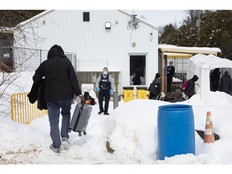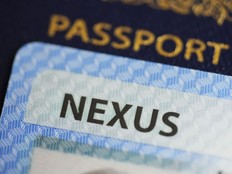Article content
Canada and the United States on Friday changed a two-decade-old refugee agreement as part of their attempts to reduce the record influx of asylum seekers entering Canada via unofficial border crossings.
The deal was the news highlight of U.S. President Joe Biden’s first visit to Canada as president and could provide some relief to Canadian Prime Minister Justin Trudeau, who is under pressure from political opponents to take action.
Article content
The Safe Third Country Agreement, signed in 2002 and which came into effect in 2004, originally meant asylum seekers crossing into either Canada or the United States at formal border crossings were turned back and told to apply for asylum in the first “safe” country they arrived in.
Advertisement 2
Article content
Now it applies to the length of the 6,416-km (3,987-mile) land border. Under the revised pact, anyone who crosses into either country anywhere along the land border and who applies for asylum within 14 days will be turned back.
It comes into effect at midnight on Saturday. A Canadian government source not authorized to speak on the record said there would be increased police patrols near select unofficial crossings but no major assigning of enforcement resources yet.
“Both of our countries believe in fair and safe, fair and orderly migration, refugee protection and border security. This is why we will now apply the Safe Third Country Agreement … between official points of entry,” Trudeau told reporters.
DIRT PATH ENTRY
Article content
Advertisement 3
Article content
The vast majority of irregular asylum seekers coming to Canada cross at Roxham Road, a narrow dirt path linking New York State with the province of Quebec. Almost 5,000 crossed in January, and about 4,500 in February, according to Canadian government statistics.
Hours before the new deadline kicked in, Roxham Road was relatively quiet. A Reuters photographer at Roxham Road saw a group of 11 Turkish refugees cross into Canada, brought to the border by a Turkish Uber driver.
“I still drive a cab so I don’t care. For me, I don’t care,” the driver said when asked what will he do when the border is closed to irregular crossings.
“I feel bad for the people.”
Canada, which has been pushing for such a revision for years, was under added pressure to reach a deal after almost 40,000 asylum seekers crossed irregularly last year, a ninefold increase from 2021, when coronavirus pandemic measures were in effect, and more than double pre-pandemic 2019.
Advertisement 4
Article content
After the changes take effect, such migrants would be turned back. At the same time, Canada promised to take in 15,000 displaced people from the Western Hemisphere.
‘UNWORKABLE’
The Canada Border Services Agency (CBSA), which polices ports of entry, and the Royal Canadian Mounted Police (RCMP), which polices the rest of the border, referred questions about enforcement to Immigration, Refugees and Citizenship Canada, a federal government department.
The department referred questions about enforcement to the CBSA and RCMP, saying in a statement the two bodies will “work together to uphold Canada’s border integrity.”
Taxi driver Tyler Provost said he was worried about what will happen to migrant families affected.
Advertisement 5
Article content
“We have a family that was supposed to come from Afghanistan tomorrow. … We’re supposed to pick them up at 11 but I can’t because where am I going to bring ’em?”
Twice, the Safe Third Country Agreement has been overturned by Canadian courts and, twice, appeals courts have upheld it. The latest legal challenge went to the Supreme Court last fall and a decision is expected in coming months.
Refugee advocates have warned these measures will drive people underground and push them to pick riskier routes.
“It’s unworkable. How is a border this length monitored? People will cross undetected. People will cross in a more dangerous way,” said refugee lawyer Maureen Silcoff.
“It’s a losing proposition to seal the border.”
(Additional reporting by Christinne Muschi Reporting by Anna Mehler Paperny and Ted Hesson Editing by Denny Thomas and Grant McCool)
Stay connected with us on social media platform for instant update click here to join our Twitter, & Facebook
We are now on Telegram. Click here to join our channel (@TechiUpdate) and stay updated with the latest Technology headlines.
For all the latest Business News Click Here
For the latest news and updates, follow us on Google News.







Comments
Postmedia is committed to maintaining a lively but civil forum for discussion and encourage all readers to share their views on our articles. Comments may take up to an hour for moderation before appearing on the site. We ask you to keep your comments relevant and respectful. We have enabled email notifications—you will now receive an email if you receive a reply to your comment, there is an update to a comment thread you follow or if a user you follow comments. Visit our Community Guidelines for more information and details on how to adjust your email settings.
Join the Conversation